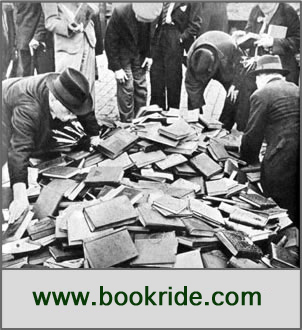
'Bookselling is easy', someone said 'you buy a book for a dollar and sell it for two.' That's pretty much it --although it is a better idea to sell it for three dollars. In my experience books are very easy to buy but money is usually scarce, so it is difficult to understand why booksellers make it so hard for customers to buy books from them. Money is what we want, money to buy more books. However when a bookseller is not shooting himself in the foot, he is usually punching himself in the face.
In the comments on the last post several people mentioned the much hated bookshop on Love Street in San Francisco, where customers are routinely demeaned by petulant staff - a typical scene being a young woman who found about a dozen books she wanted to buy and as she made her way through the shelves to find a few more, she was informed by an assistant - 'this is not a library'. She put the books down and left the shop forever (after.)
Dylan Moran said of his great curmudgeonly creation, the bookseller of 'Black Books'- "There is a guy in a Dublin bookshop who provided the image of Bernard Black. He looks like he’s swallowed a cup of sour milk and peed himself at the same time. He has this green bilious expression, years of displeasure have shaped his face. In fact he looks like every other second hand bookshop owner I’ve seen. It seems to go with the job - being miserable....He’s still there now seething in his ash-smudged cockpit, daring somebody to buy a book".
Booksellers are always looking for the right way of getting it wrong -to 'fail better.' Here are some useful guidelines.
1. Price your books so high that they will not sell.
2. Make sure the price is high enough that the customer will not only not buy the book but also never come back to your shop.
3. Make sure your shop looks as if is closed so that no one comes in. Poor or sparse lighting can help.
4. Make sure the door is hard to open.
5. Post a lot of imperious notices around the shop 'No Mobile Phones' 'Thieves will be prosecuted' 'No returns' 'All sales Final' etc.,
6. Greet the customer with a glower, a scowl or a look of deep mistrust. If you are feeling generous a frosty 'Good Morning! will suffice.
7. Ask them exactly what they want and if you do not have it be sure they leave before they can look round.
8. If they don't buy anything follow them with your eyes to the door and plant an imaginary dagger between their shoulder blades and bid them a joyless and sneering goodbye.
9. Refuse all offers on books with utter contempt and only give a discount (10% absolute maximum) when explicitly requested by long established booksellers who are listed in every guide book and who are spending at least £100.
10. Calculate the
 discount to the nearest penny even if the amount is many hundred of pounds. Thus £112 becomes £100. 80.
discount to the nearest penny even if the amount is many hundred of pounds. Thus £112 becomes £100. 80.11. If you take credit cards charge an extra 5% to cover expenses.
12. Always close exactly on time no matter how many customers are in the shop or how much they are buying.
13. If a customer puts a book aside give them 24 hours to decide but put the book out 24 hours later to the minute.
14. If another dealer buys an expensive book have a searching enquiry as to what went wrong; if it was priced by a member of staff fire them immediately.
14. If someone dares to phone you offering you a collection of rare books treat them with great suspicion, if any titles are mentioned dismiss them as common and undesirable. If they insist ask them to bring the books to the shop. If they intimate that the books are of very high quality, but they want nothing or very little for them, pick them up in your shooting brake on your way home.












